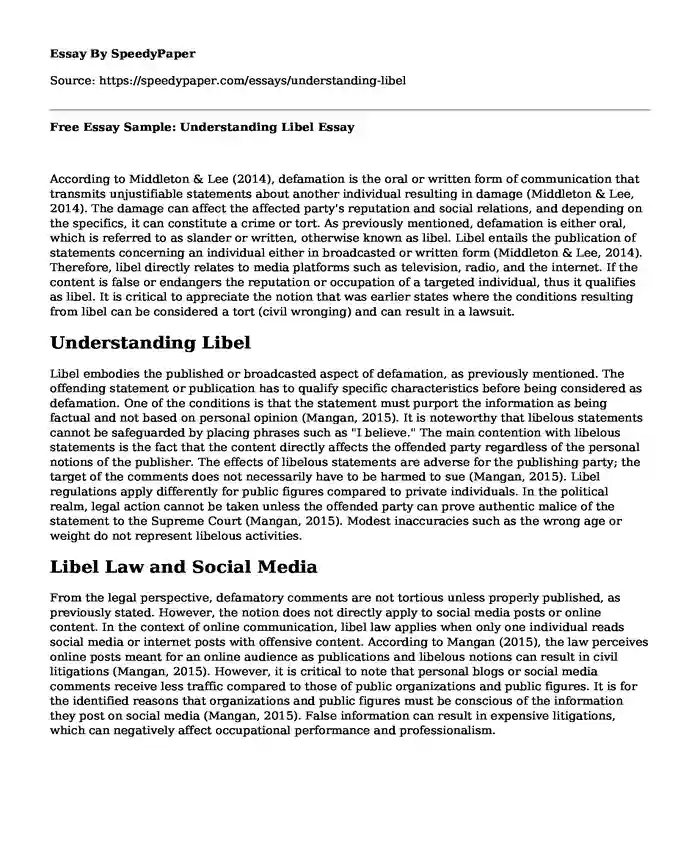
| Type of paper: | Essay |
| Categories: | Psychology Ethics Social media Human behavior |
| Pages: | 3 |
| Wordcount: | 770 words |
According to Middleton & Lee (2014), defamation is the oral or written form of communication that transmits unjustifiable statements about another individual resulting in damage (Middleton & Lee, 2014). The damage can affect the affected party's reputation and social relations, and depending on the specifics, it can constitute a crime or tort. As previously mentioned, defamation is either oral, which is referred to as slander or written, otherwise known as libel. Libel entails the publication of statements concerning an individual either in broadcasted or written form (Middleton & Lee, 2014). Therefore, libel directly relates to media platforms such as television, radio, and the internet. If the content is false or endangers the reputation or occupation of a targeted individual, thus it qualifies as libel. It is critical to appreciate the notion that was earlier states where the conditions resulting from libel can be considered a tort (civil wronging) and can result in a lawsuit.
Understanding Libel
Libel embodies the published or broadcasted aspect of defamation, as previously mentioned. The offending statement or publication has to qualify specific characteristics before being considered as defamation. One of the conditions is that the statement must purport the information as being factual and not based on personal opinion (Mangan, 2015). It is noteworthy that libelous statements cannot be safeguarded by placing phrases such as "I believe." The main contention with libelous statements is the fact that the content directly affects the offended party regardless of the personal notions of the publisher. The effects of libelous statements are adverse for the publishing party; the target of the comments does not necessarily have to be harmed to sue (Mangan, 2015). Libel regulations apply differently for public figures compared to private individuals. In the political realm, legal action cannot be taken unless the offended party can prove authentic malice of the statement to the Supreme Court (Mangan, 2015). Modest inaccuracies such as the wrong age or weight do not represent libelous activities.
Libel Law and Social Media
From the legal perspective, defamatory comments are not tortious unless properly published, as previously stated. However, the notion does not directly apply to social media posts or online content. In the context of online communication, libel law applies when only one individual reads social media or internet posts with offensive content. According to Mangan (2015), the law perceives online posts meant for an online audience as publications and libelous notions can result in civil litigations (Mangan, 2015). However, it is critical to note that personal blogs or social media comments receive less traffic compared to those of public organizations and public figures. It is for the identified reasons that organizations and public figures must be conscious of the information they post on social media (Mangan, 2015). False information can result in expensive litigations, which can negatively affect occupational performance and professionalism.
Practices for Avoiding Defamation on Social Media
From the discussion, libel is the written or broadcasted form of defamation. In today's society, libelous content is increasing and adversely affecting public perceptions of organizations and public figures. However, it can be avoided by taking into consideration specific practices designed to negate libelous statements and comments.
Think carefully about what is being written; it is essential for organizations using social media to consider the information to be posted and how it might affect the involved parties. Such considerations can help organizations attain factual information before posting for public review.
Be specific with the information; as previously mentioned, being specific negates libelous notions as the information is based on facts. The evidence can be used to defend the notions posted in case of legal litigation.
Posts should not be based on emotion; depending on the content, online or social media posts should not be created based on emotions such as anger. The information represents the organization's perspective on the issue at hand.
The posts must be clearly identified as either being a joke or a factual statement. Posting information that is meant for entertainment purposes can be perceived differently by the targeted party. Therefore, such posts should be clearly identified as either being a joke or not.
Avoid criminalizing individuals or associating them with criminal or terror groups. The practice critically applies to social media posts where individuals and organizations post personal information. When an organization aligns the targeted party with criminal activities, a lack of evidence can result in legal repercussions.
References
Mangan, D. (2015). Regulating for responsibility: reputation and social media. International Review Of Law, Computers & Technology, 29(1), 16-32. https://doi.org/10.1080/13600869.2015.1008960
Middleton, K. R., & Lee, W. E. (2014). The law of public communication (9th ed.). Boston, MA: Pearson Education.
Cite this page
Free Essay Sample: Understanding Libel. (2023, Jul 10). Retrieved from https://speedypaper.com/essays/understanding-libel
Request Removal
If you are the original author of this essay and no longer wish to have it published on the SpeedyPaper website, please click below to request its removal:
- Promotion At Work Essay Samples
- Essay Example. Management Skills
- Gene Ownership. Free Essay
- Would You Prefer Not To? Paper Example
- The Impact of Music on Social Relationships, Mental Health, and Well-Being - Essay Sample
- Free Paper Sample on Media in U.S. President Election
- Free Essay Sample on Life Change
Popular categories




